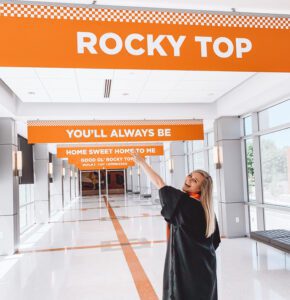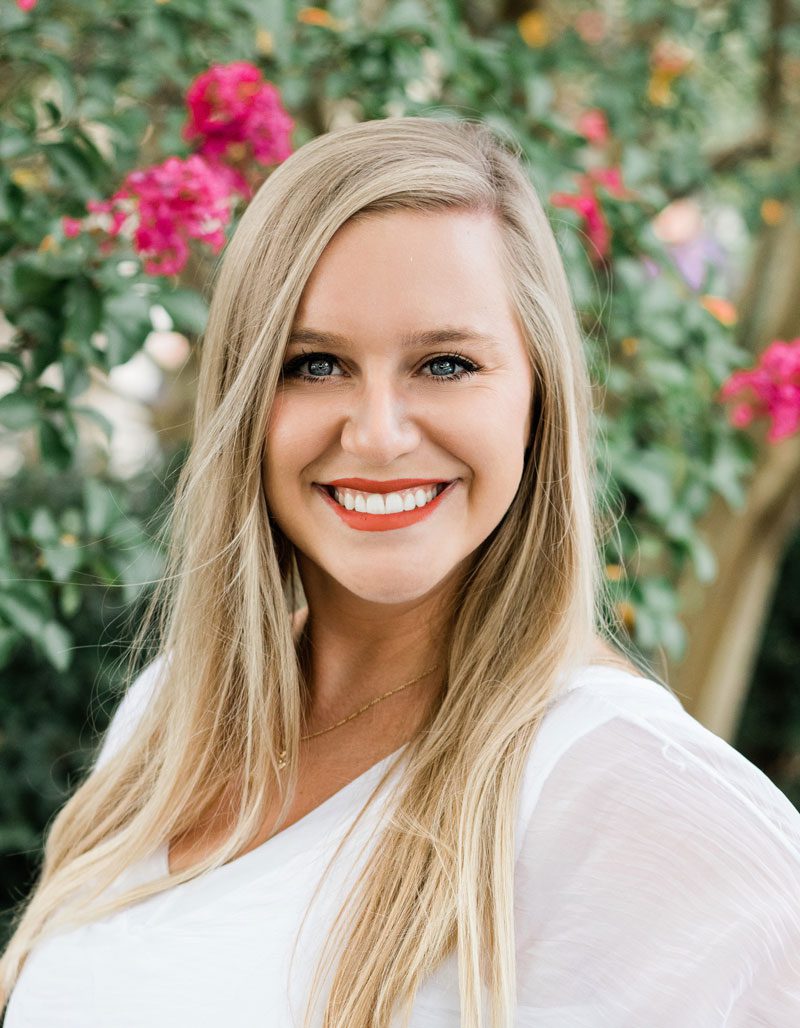Throughout her time as an undergraduate and graduate student at the College of Communication and Information, Kylie Julius has pulled much of her strength and inspiration from the faculty she says “took a chance” on her. But their investment in her paid off when Julius not only graduated with her master’s from CCI this past May, but when one of the papers she authored was accepted to be published, and yet another was presented at the National Communication Association’s 108th Annual Conference in November.
Support from CCI Faculty
When speaking about her education, Julius centers it on the people who have supported her along the way. She first found Communication Studies as an undergraduate when she was advised by CCI Master Advisor Rochelle Nelson that the area of study would be a good fit for Julius. The first Communication Studies class she took was taught by Associate Professor John Haas, and Julius said that was when it all clicked into place.
After she earned her undergraduate degree, Julius said it was CCI Associate Dean of Graduate Studies Virginia Kupritz who encouraged her to pursue a master’s. Julius continued to list off all the people who have had a significant impact on her education these past few years, such as her advisor Professor Joan Rentsch; associate professors Emily Paskewitz and Quinten Bernhold, who both co-authored papers with Julius; and Associate Professor Courtney Wright, whose course on interpersonal conflict and communication led Julius to her current area of research on workplace bullying.
“All of those individuals significantly invested in me and helped me to get where I am today, and I think it’s important to give credit to those people who have impacted your career. I wouldn’t have made it through my graduate program and thesis without them,” she said.
Julius said she is appreciative of the on-going support through the program from her advisor, Rentsch. As for Rentsch, she said Julius was a model graduate student whose research continues to produce papers and impactful work.
“Kylie is hardworking and a bright, creative, yet disciplined thinker. To top it off, she is cheerful, kind, and simply a delight to work with,” Rentsch said. “Her thesis project rivals the quality of many dissertations I have read and has potential to advance the research on workplace bullying.”
Research on Workplace Bullying
When Julius needed to find a topic in Wright’s class to research and tie into a theory, she saw workplace bullying and immediately related it back to an experience she’d had working in restaurants.
“I experienced workplace bullying and I think I was so shocked I didn’t know how to respond to it, as one normally doesn’t in these types of interactions, and I realized that this other person (the bully) had violated my expectations for how humans should treat one another. I realized there was an excellent tie, this Expectancy Violations Theory (EVT),” she said. “And Wright opens things up to you to recognize varying perspectives centered around communication. She challenges you, and it genuinely makes all the difference because you find what it is you’re looking for, what you’re passionate about, moving forward.”
Julius found that passion in her topic and continued exploring it, with an eye for not only how workplace bullying occurs, but also around the communication and behaviors of management in response to the bullying.
This work for her thesis also resulted in three papers, including one she authored, with Rentsch and Bernhold as co-authors, that has been accepted for publication by the Western Journal of Communication: Barbaric Bullies, Tormented Targets, and Muddled Managers; An EVT Framework for Predicting Managerial Intervention to Alleviate Workplace Bullying. The paper she presented at NCA, Intensity of Managerial Interventions to Mitigate Workplace Bullying, an Expectancy Violation Theory Approach, was co-authored by Rentsch and Paskewitz.
In this work, Julius sets forth a course of how to identify bullies and bullying behavior along with increasing awareness within organizations to be more proactive about dealing with the issue of bullying. She also looks at when and why managers choose to intervene, and provides tools to help organizations stop workplace bullying. Finally, she gives organizations a reason beyond an emotional appeal as to why this is an important issue that needs to be tackled—which is that a workplace bully costs an organization about $2 million annually due to turnover, low morale, and other disruptions they cause.
“It’s finding a way to make it applicable to organizations, where I think sometimes there’s a disconnect. There’s a wealth of knowledge and research, so how are we going to apply it, and how are we going to get companies to buy into these ideas? I find that when you talk in terms of numbers and how it affects the overall organization’s bottom-line and community, then it connects,” she said.

Next Career Steps
Getting organizations to implement measures to recognize and address workplace bullying effectively is what really interests Julius and is driving her to continue her education and earn her doctorate. Her ideal career would be to work in industry applying techniques learned from her research to mitigate workplace bullying, and to also work in academia teaching students how to use communication within organizations to prevent such behavior from occurring in the first place.
Earning that “doctor” title has been on her mind for a while, as Julius always hoped to follow in the footsteps of her grandfather, Dr. Clark E. Julius, who founded Knoxville Dermatology. His kindness as a grandfather and in his position as an employer left an impression on Julius, and that has fueled her to continue achieving in her own field.
“I always wanted to be the second Dr. Julius, and I figured I can do it in this role. Even though it won’t be medical, I am hoping it will be something kind and impactful paralleling my grandfather’s character,” she said.
She has applied to doctoral programs but does not know yet where she will be attending.
Julius already has teaching chops as she was a graduate teaching assistant for Communication Studies and is currently a lecturer teaching CMST 210: Public Speaking and CMST 240: Business/Professional Communication. She’s enjoyed being a student and a teacher at the University of Tennessee, Knoxville, and is looking forward to what the future could bring.
“I just felt at home here. I’ve had an amazing time at the University of Tennessee!” she said.

